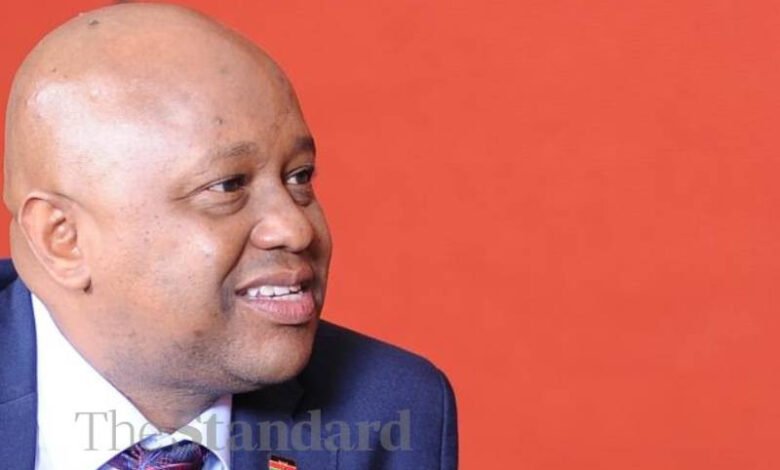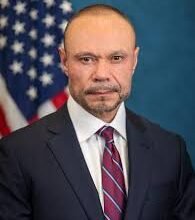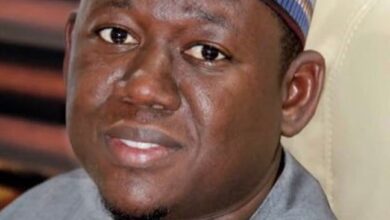Tony Gachoka Biography: Family, Spouse, Real Name, Career, Net Worth, Age (2025)

Tony Gachoka Biography: Tony Gachoka is a well-known Kenyan political commentator, media personality, and strategic thinker whose bold views have influenced national conversations for decades. He is best recognized for his involvement in investigative journalism during the 1990s, his legal activism on matters of national importance, and his presence in Kenya’s political circles both as a behind-the-scenes adviser and a frontline critic. Over the years, he has maintained a complex public image—admired by some for his fearlessness and criticized by others for his unpredictable conduct.
As of 2025, Tony Gachoka’s estimated net worth is approximately KSh 10 million. His income is drawn from a combination of media consultancy, political advisory work, legal activism, and limited business holdings. Though not as wealthy as some of his contemporaries, his value lies more in influence than capital. This article presents a complete and updated biography of Tony Gachoka, including verified details on his real name, age, family background, spouse (where applicable), professional career, controversies, net worth, and his enduring impact on Kenyan public life.
Tony Gachoka Biography
Tony Gachoka was born into an elite Kenyan family with considerable influence in the business sector during the post-independence economic boom. His full legal name is Tony Gachoka, and it is under this name that he has conducted his public and professional affairs. He is the son of Muiruri Gachoka, a former senior public servant and founder of Central Kenya Agencies, one of Kenya’s most prominent alcohol distribution companies in the 1980s. The Gachoka family was deeply embedded in Kenya’s political and business elite during the Daniel Arap Moi era.
Despite his privileged upbringing, Tony Gachoka did not follow a conventional elite path. He turned instead to investigative journalism, media activism, and legal reform initiatives, carving out a career that often put him at odds with powerful individuals and institutions. His boldness and confrontational style have defined both his media and political journey, often attracting controversy but also public admiration for his outspokenness.
Tony Gachoka Age 2025
Tony Gachoka is 55 years old in 2025. Based on interviews, public documents, and media archives that place his early career in the late 1980s and early 1990s, it is widely understood that he was born around 1970. His age places him within a generational cohort that experienced Kenya’s shift from single-party rule to multiparty democracy firsthand. Over the years, he has matured from a firebrand journalist into a calculated political operator, with a perspective informed by decades of involvement in governance, activism, and institutional reform.
Tony Gachoka Family Background and Early Life
Tony Gachoka’s biography cannot be understood without reference to his family’s prominence in Kenya’s economic development during the late 20th century. His father, Muiruri Gachoka, was among the early African businessmen who seized postcolonial opportunities in wholesale and distribution. Central Kenya Agencies, under his leadership, held lucrative distribution rights for international wine and spirits brands and was based in the Mount Kenya region.
However, by the 1990s, the family business began to unravel due to mounting debt obligations, shifting regulatory frameworks, and internal conflict. A notable episode involved a KSh 45 million loan dispute between the family and a local bank, secured by family-owned properties. The disagreement escalated into legal battles that brought the Gachoka name back into the public spotlight, this time for financial woes and succession disputes.
Tony Gachoka himself was at the center of these family conflicts, with some relatives accusing him of mismanaging inherited property. He defended himself in interviews, citing poor financial governance within the family and systemic exploitation by banks during the economic liberalization period. These disputes, while personal, reflected broader themes of postcolonial wealth transfer and the fragility of African family enterprises.
Tony Gachoka Education and Early Career Path
Little has been publicly documented about Tony Gachoka’s formal education. However, his command of media and legal language, as well as his strategic understanding of Kenyan politics, suggests a background in communications or law. His early career began in media circles, where he worked as a publisher and editorial contributor. In the 1990s, he founded and published the Sunday Post, a short-lived but highly influential tabloid that regularly challenged state narratives and exposed corruption.
The Sunday Post was particularly bold in its coverage of the Goldenberg scandal, judicial misconduct, and the abuse of public office. Gachoka used the publication to mount direct attacks on members of the political and judicial elite, citing documents and testimonies that many mainstream outlets feared to publish.
This fearless approach led to his arrest and subsequent conviction for contempt of court in 1999. He was sentenced to six months in Kamiti Maximum Security Prison, a rare punishment for a media offense at the time. International rights organizations, including Amnesty International, declared him a prisoner of conscience, and he was released after receiving a presidential pardon. This incident cemented his image as a whistleblower and positioned him as a leading figure in the fight for media freedom in Kenya.
Media Influence and Legal Advocacy
After his release from prison, Tony Gachoka remained active in both media and politics. He reinvented himself as a political analyst and legal activist, using his platform to continue raising questions about governance, transparency, and institutional integrity. He appeared regularly on national television and participated in political debate shows, particularly in the 2010s.
Between 2005 and 2009, he served as Chief of Protocol in the Office of the Prime Minister under Raila Odinga. This appointment placed him at the heart of Kenya’s executive branch during the Grand Coalition Government. His role involved managing official visits, coordinating intergovernmental engagements, and advising the Prime Minister on communication strategies. His proximity to power during this period is believed to have expanded his network significantly, making him a valuable political consultant in subsequent years.
Gachoka later returned to the spotlight through litigation. In 2024, he joined a coalition known as the Mt Kenya Jurists to file a constitutional petition opposing the 30-year lease of Jomo Kenyatta International Airport (JKIA) to a private investor. He cited a lack of transparency, violation of public procurement laws, and national security risks. His petition made headlines and was viewed as part of a growing citizen-led resistance to the privatization of state infrastructure.
In 2025, Gachoka accused his legal team of acting without his consent when they filed for an adjournment of the case. He claimed that the lawyers prioritized other clients and compromised the integrity of the lawsuit. This episode demonstrated his continued commitment to institutional accountability, as well as his insistence on ethical standards within the legal fraternity.
Entry into Formal Politics
In June 2025, Tony Gachoka officially announced his entry into elective politics by joining the Kenya African National Union (KANU), one of the oldest political parties in the country. During a press conference at KANU headquarters, he confirmed that he would be running for Nairobi Governor in the 2027 General Elections.
Gachoka stated that his decision was driven by a need to shift from advocacy to implementation. He pledged to restore integrity in Nairobi County leadership, address systemic failures in public service delivery, and create a more transparent and accountable local government. His campaign is expected to draw support from middle-class voters, civil society actors, and the urban poor who identify with his anti-corruption stance.
While KANU is no longer the dominant force it once was, Gachoka’s entry could signal an attempt to revive the party’s urban appeal. Political analysts predict that his candidacy will add intellectual and legal depth to the gubernatorial race. However, he will face stiff competition from better-funded rivals aligned with major political alliances.
Tony Gachoka Spouse and Personal Life
There is limited publicly verified information regarding Tony Gachoka’s marital status or current spouse. While it is known that he has children from previous relationships, the identities and details of his immediate family have been kept largely out of the public domain. In the past, Tony Gachoka has faced legal disputes involving his ex-wife and children, especially in connection with property ownership and domestic arrangements.
In one high-profile report, he was accused by family members of evicting them from the family home, a claim that sparked public outrage and renewed interest in his personal life. He has not publicly commented on these accusations in recent years, and most media coverage has shifted back to his public advocacy and legal work.
Despite these controversies, he appears to maintain an active personal life, participating in social functions, networking events, and civic forums. His reputation remains a mix of brilliance and volatility—attributes that define many high-profile public figures.
Tony Gachoka Net Worth (2025)
Tony Gachoka’s net worth in 2025 is estimated at approximately KSh 10 million. Unlike corporate moguls or career politicians, Gachoka’s wealth is derived from intellectual capital, strategic advisory work, and a variety of consultancy engagements. While he no longer controls large family estates, he maintains financial stability through media-related contracts, legal activism grants, public speaking engagements, and informal business partnerships.
His financial setbacks—especially those tied to family property disputes—have affected his ability to scale long-term investments. However, his strategic value remains high, particularly among emerging political players who seek his insights into media dynamics, legal reform, and political communication.
There is no confirmed evidence of corruption or financial misconduct associated with Gachoka in any official government report. His financial conduct, while modest, appears to align with his public stance on accountability and prudent resource use.
Controversies and Legal History
The biography of Tony Gachoka cannot omit his long history of legal and reputational controversies. Apart from the 1999 imprisonment for contempt, he has faced several defamation suits, one of the most prominent being the 2018 court case involving businessman Jimi Wanjigi. In that case, Gachoka and journalist Jeff Koinange were ordered to pay damages for defamatory comments made during a live television broadcast. Both men were briefly held in contempt before settling.
In 2019, he was arrested at a private airstrip in Kwale County and charged with being a public nuisance, allegedly under the influence of alcohol. He denied the accusations and was released on bail. While these incidents have dented his image among some segments of the public, his core supporters interpret them as symptoms of a high-risk, high-stakes public life.
Public Perception and Legacy
Tony Gachoka remains a polarizing figure in Kenyan public life. Supporters admire his fearlessness, intellectual clarity, and refusal to be silenced. Detractors criticize his confrontational tone, personal misjudgments, and occasional lapses in decorum. Regardless of where one stands, there is consensus that Gachoka’s impact on media freedom, legal activism, and civic engagement is significant.
He represents a generation of Kenyan thinkers who have challenged institutional power, often at great personal cost. His story is a case study in how media, law, and politics intersect in modern African democracies. Whether he succeeds in his gubernatorial ambitions or not, his role in shaping the national conversation is already well established.
Conclusion
The biography of Tony Gachoka is that of a man who has consistently chosen courage over comfort. From his early days as a whistleblowing journalist to his current role as a political candidate and legal activist, he has demonstrated resilience, intellect, and an unrelenting commitment to accountability. At 55 years old, he continues to shape Kenya’s democratic journey, sometimes from the courtroom, sometimes from the campaign trail, and always from a place of conviction.
Whether admired or criticized, Tony Gachoka remains one of the most dynamic voices in Kenya’s public space—a figure who challenges norms, provokes thought, and refuses to be ignored.




